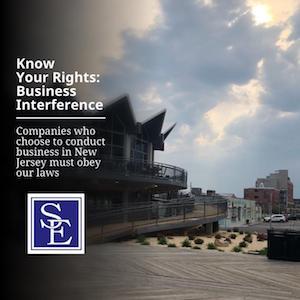OF DISCRIMINATION AND HARASSMENT
Business Interference

Our office has been successful in bringing affirmative claims against employers who overzealously attempt restrictive post-employment activities of employees or otherwise have no legal right to interfere with an employee’s post-termination pursuit of employment.
One potential claim available against an employer who attempts to interfere with an employee’s post-termination employment or business activities is a claim for tortious interference of prospective economic advantage or tortious interference of a contract. New Jersey law prohibits a person or entity from tortiously interfering with another’s employment or business and will provide legal protection of an existing or prospective contractual relationship from undue outside interference. A claim of tortious involves interference with contractual relations and tortious interference with prospective economic advantage are similar torts with the primary differences being that tortious interference with contractual relations interference with an existing contract, whereas tortious interference with prospective economic advantage requires only interference of a protectable interest.
The law against tortious business interference is designed to protect the luring of employment or business opportunity of another by devious, improper or unrighteous means. The law protects a person in his or her pursuit of a livelihood. While an individual or business cannot complain of legitimate competition from another, the law protects those who fall victim to illegitimate acts of overreaching or of other conduct that is below the standard of fairness.
In order to prove a claim of business interference, an employee must prove five elements. First, an employee must show that he or she had a prospective economic or contractual relationship giving rise to a reasonable expectation or economic advantage. This requires that the aggrieved person not only has a reasonable expectation of economic advantage, but also that he or she was in the pursuit of business or employment. Second, an employee must show the former employer knew of his or her employment. Third, the employee must show that the interference of the former employer was done intentionally and with malice. The term “malice” is not used in the literal sense requiring ill will toward the employee, but instead, means that the harm was inflicted intentionally and without justification or excuse. Fourth, an employee must demonstrate the interference caused the loss of the prospective economic gain or contract. The termination of employment or temporary suspension until the dispute is resolved will likely suffice to proving this element of the cause of action. The fight and final element is the injury caused by the damage. This is proven if the prior employer’s actions caused the new employer to terminate or suspend the employee’s new employment.
Our New Jersey employment lawyers have successfully litigated claims of tortious business interference against employers for maliciously enforcing post-termination restrictions against the former employee in their new employment. If you believe a former employer has unjustly interfered with your new or prospective employment, please call one of our business interference lawyers to discuss the specific facts and circumstances of your situation.





